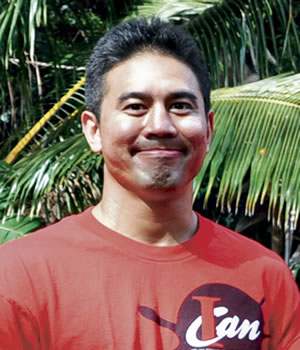Brent Kakesako
Earlier this month, a group of 40 volunteers visited the Kanewai lo’i gardens in Honolulu to harvest kalo, fertilize the lo’i and clean the grounds. About half of the workers were Iolani graduates coming together for a different kind of high school reunion through the Iolani Community Action Network (ICAN) at its annual One Day, One Team service day. On that day, an even larger group of alumni assisted Lanakila Meals on Wheels in delivering meals to seniors.
Among the volunteers in the lo’i that day was Brent Kakesako, a 2003 Iolani graduate who now is the chief operating officer at the Hawaii Alliance for Community-Based Economic Development. Four years ago, Kakesako and a group of other recent graduates launched ICAN as a way to not only serve the community, but also to help instill a commitment to service in a new wave of students.
“At the time, there wasn’t an opportunity for alumni to connect other than at the typical networking events,” Kakesako says.”In addition to giving back, we also wanted to show (Iolani) administration that (service) should be incorporated into the school’s activities more.”
Each year, One Day, One Team takes place at various sites around the world. This year, alumni volunteers in Los Angeles led book discussions with Reading to Kids. In Boston, they served food to homeless families. In Tokyo, they spent quality time with children at an orphanage. Other projects took place in Hong Kong, Seattle, Washington, D.C., and San Francisco.
In addition to One Day, One Team, the local chapter of ICAN coordinates one service project per quarter. This winter, they will assist with Family Programs Hawaii’s holiday party to greet guests, distribute toys and prepare food. Locally, the volunteer base also is comprised of current Iolani students and their families, as well as other community members.
Since ICAN’s launch, Kakesako says that Iolani has introduced a service learning and social entrepreneurship class into its curriculum.
“As a group, we want to push the conversation that these sorts of opportunities should be available to students,” he explains.
While ICAN helps various organizations, the way Kakesako sees it, it’s really a symbiotic relationship. Not only do they serve these groups, but their work provides an educational experience to the participants. “We focus on projects that facilitate continued learning,” he says. “Working in the lo’i, we learned about cultural practices and traditional kalo farming.
“We would be open to working with any (group) that needs help and would like to share what they are doing,” Kakesako says.
ICAN always welcomes anyone to help with its projects and currently is seeking volunteers to join its planning committee. For more information, email iolanican@gmail.com or call 943-2309.






